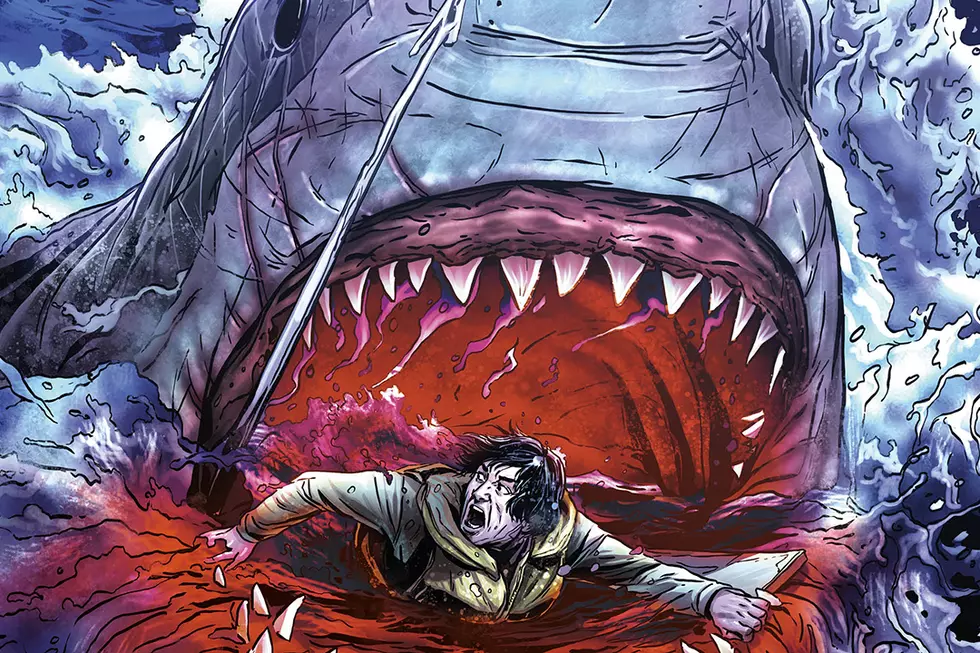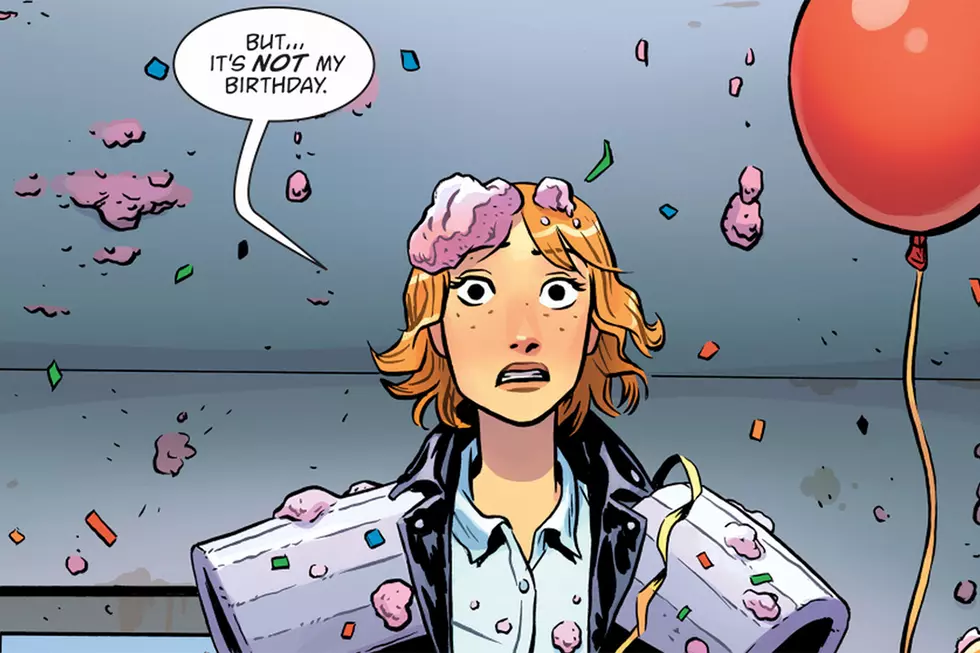![A Real Human Being, And A Real Hero: Gary Phillips On ‘Vigilante: Southland’ [Interview]](http://townsquare.media/site/622/files/2016/07/Vigilante01.jpg?w=980&q=75)
A Real Human Being, And A Real Hero: Gary Phillips On ‘Vigilante: Southland’ [Interview]
This week sees the release of DC Comics' new revival of the classic Vigilante character in Vigilante: Southland by Gary Phillips, Elena Casagrande, Giulia Brusco and Todd Klein, which takes the concept and transports it modern day Los Angeles for a tale of crime, corruption and community tension. ComicsAlliance caught up with Phillips to talk about what separates the new Vigilante from the rest of the DC Universe, and constructing a socially relevant superhero story.
ComicsAlliance: How did the series come about? How much was DC wanting a Vigilante series, and how much was your own take on the concept?
Gary Phillips: Well yes, here’s how it happened in sort of an organic way: Dan DiDio and I had been talking about a couple of different ideas for a while, and the context of that was the idea of reviving this or that DC character, but we’d also been talking about the setting. Where would the story take place? And because I’m a mostly prose crime and mystery novelist, and a lot of my concentration is in the Los Angeles and the Southland of southern California, we thought that would be a good setting because it’s not the usual place you tended to see some of the DCU characters.
Although I had done for Vertigo, some years ago, a private eye miniseries called Angeltown, set in Los Angeles. So those two things were part of the discussion, and so finally when we really got down to who would be the character in that setting and we talked about a number of different characters that didn’t seem to be quite what gelled, the idea of reviving and reimagining The Vigilante as a young black man who has come of age in south L.A., that seemed to be the thing that really worked best, so that’s how we got to where we are now with Vigilante: Southland.
CA: Vigilante is a concept with a long storied history at DC Comics. Did you go back and look at what made the other Vigilantes unique when creating Donny?
GP: Well I did, but I was fairly familiar with the original Vigilante, Greg Sanders, and I’d been a fan of that character. I’d read some of the reprint material and even that character has been revived several different times, and I was familiar with some of those stories. I was also familiar with the Adrian Chase era, which also gets us to the female Vigilante. I was aware of those incarnation and I knew that in a certain way, in some of the aspects of this particular Vigilante, I wanted to pay homage to that.
I think to your point, another aspect to talk about or look at was, neither one of those characters had a superpower, right? They didn’t have a forcefield, they didn’t fly, they didn’t have X-Ray vision, and to me that’s a great character because you can really keep them still on a street level way, but say, “Now we’re gonna put them under pressure. Now we’re gonna put screws to them and see how they react” because they can’t fly away or punch their way through a wall. The bullets don’t bounce off of them, and because they are vulnerable just like you and me.
We’ve given them an edge or two, but they are still human beings, they feel capable of pain and hurt and death so to me as a writer that gives them a great dramatic edge to play with and to set that character in motion against sometimes what might seem like impossible odds.
CA: Is it easy to transfer everything you’ve learned as a crime and mystery author into a superhero setting?
GP: No, it isn’t! [Laughs] It’s not, I mean comics have come a long way in terms of the way you can tell a story, but you still have to practice a certain kind of shorter, almost staccato style, which in longform and in novels you have all the real estate you can generate to tell your story.
Comics, by the nature of the medium, the nature of how they’re constructed, we know that’s a very short burst, and so you have to think in a different way of how you’re going to tell your story.
Also, I wanna emphasize that while Vigilante: Southland is a superhero book in the sense that he puts on a mask, I still see it very much more as a crime comic, but it’s more of an amalgam. Yes, he has on a mask but he can’t fly, like I said. He rides a motorcycle to get to where he’s going. He has certain devices that he uses, but they’re within the realm of possibility, there’s a human scale to what he works with. I think in that regard both the superhero fan and the crime and mystery fan will find something to like in this miniseries.
CA: Vigilante: Southland is a very socially relevant comic, but is it hard to keep up with the pace of the news and the events that inspire this kind of story?
GP: That’s a very good question, and I think the answer lies within the question, which is to say, you’re right.
The events of our world, and the events of this insane presidential election that this country finds itself in at this moment in time, you cannot keep up in that regard. What you can do is take those kinds of incidents, or take things like Black Lives Matter or questionable police shootings or what have you, and use them as a springboard for your story, so you don’t imitate specifically any given incident, but you try to capture the emotion of the zeitgeist of that effort, or that contention or that discussion and that’s what you try to bring forth in the story so you’re not just reading the headlines and just writing about them, because it’s still about the characters, and it’s still about making comics fun.
Yes, I wanna make it relevant, and I want to have it grounded in a kind of reality, but I also want to entertain, I also want to tell you this fascinating story with these interesting characters, and so you try to achieve a balance, and as I’ve said elsewhere, my job is not to preach or have polemics or have my characters stand on a soapbox. My job is to set my characters in motion.
The fact that they have certain perspectives or certain points of view then helps to inform me how they might speak, what their dialogue is, how they might react to certain things, but we’re not pointing neon arrows saying, “See how self-righteous they are,” or, “See how correct they are with their ideology.”
That’s not the goal; the goal is to have that stuff there, but it’s not the whole person, it’s not all that you want to say about them, it’s part of them. It’s gonna come out in certain ways, but hopefully it comes out in an organic way rather than stopping the action to point the finger or make some political point of view or social point of view. It’s more how it all works together in the context of telling a story.
CA: What’s your collaboration process with Elena Casagrande like?
GP: Elena, I’ve never met. She’s Italian, I think she’s in Rome. I think she lived in L.A. for a while, but so we’ve only communicated through our editor Jamie Rich or directly, because she’s asked a question or I’ve sent her certain reference material, but ... she’s absorbed all that and made an alien environment to her come alive on the page.
It’s just amazing to me. When I see some of the sketches or the panel breakdowns before the final process, I’m just knocked out that she’s able to translate this stuff that we talk about in e-mail or via visual reference, and really make it her own, and make it come alive and show it as part of the story. I can’t speak too highly of her work.
CA: I loved the little, almost incidental panels that pop-up either establishing the time of day or focusing in one piece of the scenery. Were they in the script?
GP: Some of that came about because of the conversation we’d have back and forth, so some of it she would just use, or she came up with.
In L.A. we have a lot of freeways, and we have these crazy figure eight, cloverleaf overhangs and overlaps of these various freeways. There’s the 10 and the 15 and the 210, so I wanted to give some sense of that with these little panels that have no dialogue but just kinda give you the sense of this insane Southland and how it looks.
There’s this great scene in the first issue where Percy, Donny’s dad, is working over this guy, and they’re underneath this great freeway overpass, and to me that speaks volumes about the Southland and how it looks. That crazy industrial look smacked up against palm trees, and I thought it looks terrific, and Elena just captures that.
CA: Did the costume go over many revisions to achieve something that looks new and grounded while still being recognizably The Vigilante?
GP: As I recall, it was a process over a period of weeks and months, but I don’t remember that we went through that many iterations in terms of the costume. I know early on Jamie Rich and I had some discussions about the costume and I remember specifically saying that I wanted something along the lines of The Red Hood, that is to say, “Here’s a guy in boots, pants and a windbreaker --- although it’s a bulletproof windbreaker, so that matters --- and this mask” It was important that The Vigilante’s costume look like a costume that you or I could go out and put together.
It’s not like Cyborg or Superman; it looks like a costume that you could cobble together from bits and pieces in a thrift store or an outlet store, so it was important that it had that kinda look to it. It has a certain stylized character to it, but he’s just wearing his leather jacket. He’s got this mask of course, but he’s got regular boots on and black jeans. It gives him a look, but it also keeps it a street level hero costume so it’s not this fantastic thing, I mean of course it is comics, but I wanted something that has a real world resonance in terms of how he looks.
CA: How connected to the rest of the DC Universe is Vigilante?
GP: There are references, there are oblique references to a larger shared universe, and hopefully if I get another run at the Vigilante we’ll see a bit more of that creep in, but at this moment it’s very much at the edges, because it is in L.A. where it’s a Southland that you haven’t seen much of, and you certainly haven’t seen much of in comics in general.
It’s almost as if superheroes don’t exist in this world, and here comes Donny Fairchild, who is going to switch that up some. I suppose in my mind that all of a sudden all these other people are going to start showing up, they might show up in an oblique way or a background way, but it’s really a territory that for a lot of different reasons is his territory.
More From ComicsAlliance

![Rooting For The Shark: Si Spurrier Builds A Smarter, Scarier ‘Hook Jaw’ [Interview]](http://townsquare.media/site/622/files/2016/09/Hookjaw.png?w=980&q=75)
![Christa Faust And Gary Phillips On The True Stories Behind ‘Peepland’ [Creator Commentary]](http://townsquare.media/site/622/files/2016/11/Peepland-Featured.png?w=980&q=75)





![Crime Is A Sleazy Business In Faust, Phillips And Camerini’s ‘Peepland’ #1 [Preview]](http://townsquare.media/site/622/files/2016/09/Peepland-Featured.png?w=980&q=75)
